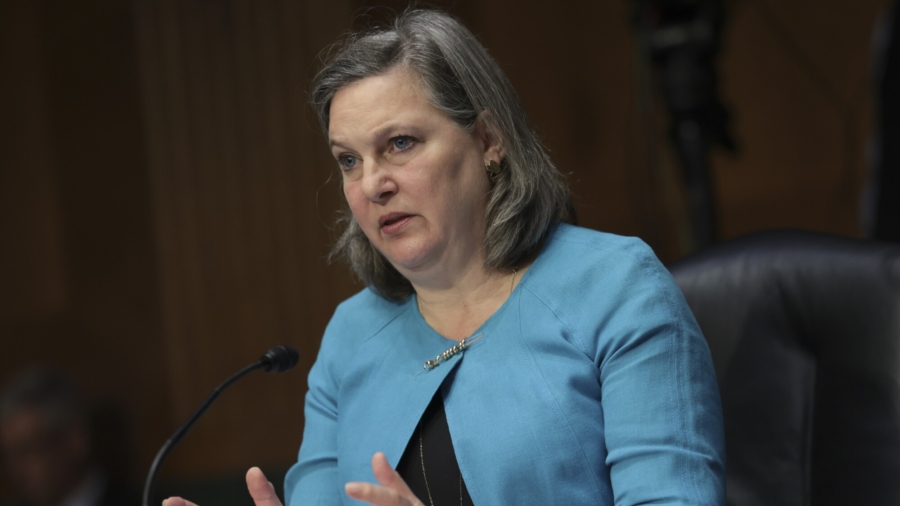The United States is prepared to immediately negotiate bringing Russia back into compliance with the New START treaty after Russian President Vladimir Putin suspended his country’s participation in the nuclear arms control agreement earlier this week.
The New START treaty limits the number of nuclear warheads each participating country can possess and allows for mutual inspections of nuclear arsenals between the United States and Russia. On Tuesday, Putin announced Russia is suspending its participation in the arms control treaty.
In an interview with the Russian state-owned TASS news agency on Thursday, U.S. Undersecretary for Political Affairs Victoria Nuland said the U.S. would immediately agree to talks to end Russia’s suspension of New START.
“We’re ready to do it tomorrow if the Russian Federation is ready. And we’re also ready to allow inspections,” Nuland said.
Under the current treaty limits, Russia and the United States are each allowed to possess 700 deployed nuclear arms, which can include intercontinental ballistic missiles (ICBMs), submarine-launched ballistic missiles (SLBMs), or arms on nuclear-capable heavy bombers. Each participating country can have up to 1,550 deployed nuclear warheads (allowing for multiple warheads on a single missile). The participants are also allowed up to 800 nuclear launchers, which can include fixed missile silos, mobile launchers, submarine-based launchers, and bombers capable of carrying nuclear weapons.
The New START treaty also allows each country up to 18 on-site inspections of the other country’s nuclear arsenal per year.
Treaty’s Uncertain Status
The exact nature of Russia’s status in the New START treaty may be a bit unclear to U.S. negotiators. Putin characterized his decision as a suspension rather than an outright end to the treaty.
“We’re not withdrawing from the agreement,” Putin said in a national address on Tuesday. “We’re just suspending [our participation in] it.”
In the weeks preceding Putin’s announcement, the U.S. State Department said that Russia had not been allowing on-site inspections of its nuclear weapons facilities, which is a key component of ensuring that participating countries are sticking to limits specified in the treaty.
On Tuesday, Putin said Western demands that Russia opens its nuclear weapons facilities to on-site inspections were “absurd.”
“The United States and NATO openly state that their strategic objective is to defeat Russia,” Putin said. “Yet they think they will be allowed to inspect our nuclear weapons facilities?”
Following Putin’s Tuesday announcement, U.S. Secretary of State Antony Blinken said, “We’ll be watching carefully to see what Russia actually does.”
Blinken described the Russian move as “unfortunate and irresponsible.”
Responsibilities To the World
The New START treaty is the last nuclear arms control treaty constraining the United States and Russia.
In 2002, then-President George W. Bush withdrew the United States from the Anti-Ballistic Missile (ABM) treaty. The treaty had limited the development of missiles meant to counter enemy ballistic missiles, in the hopes of limiting an incentive for countries to develop more ballistic missiles to overwhelm a target country’s missile defenses.
In 2018, then-President Donald Trump initiated the U.S. withdrawal from the Intermediate-Range Nuclear Forces (INF) Treaty, claiming Russia had been violating the treaty for years. That treaty prohibited land-based ballistic missiles with an intended range of 310 to 3,420 miles.
In 2020, Trump also withdrew the United States from the Open Skies Treaty, which allowed for mutual surveillance flights over participating countries to conduct aerial inspections of participating countries’ military activities.
In her interview with TASS, Nuland again described Putin’s decision to suspend the New START treaty as irresponsible.
“The U.S. and Moscow have responsibilities to the world to keep our nuclear arsenal safe and secure, and we should do our jobs,” Nuland said.
Russia may seek added conditions if it is to return to the New START treaty. In his Tuesday address, Putin said Russia will need to know more about the nuclear capabilities of France and Great Britain, which are allies of the United States in the North Atlantic Treaty Organization (NATO).
“Before returning to the discussion of this issue, we must understand for ourselves what such countries of the North Atlantic Alliance as France and Great Britain still claim, and how we will take into account their strategic arsenals, that is, the alliance’s combined strike potential,” Putin said Tuesday.

